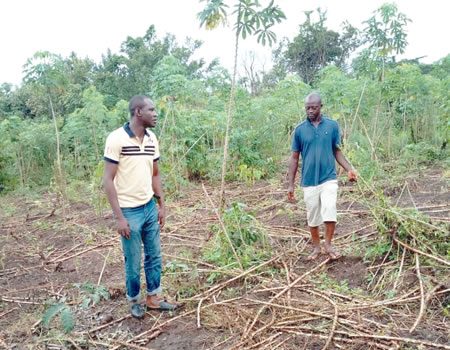Efforts to steer Nigeria away from dependency on oil export revenue through agriculture may not be feasible as many farmers express disenchantment with their beloved occupation as they suffer loss from invasion of their farms. YEJIDE GBENGA-OGUNDARE reports that many farmers in Oyo State want government to find a solution to the persistent invasion of their farmlands before the dry season so they won’t lose hope and abandon their farms and sources of livelihood.
“My experience in the last three years have been a terrible one; I suffered great financial loss in my business as a farmer and my losses were life-threatening. The constant invasion of my farm by Fulani cattlemen has created a phobia because it seems any effort I put in now is like putting in great effort without expecting results. Farming is a capital-intensive venture and I have continually put in so much to get nothing in return. Like many others, my source of livelihood is constantly threatened, yet it looks like a solution will never come.
“We have respite now and people think that the problem is over, but for me and many other farmers, we are afraid of investing again because every rainy season, the herdsmen are usually not seen, so people think they have relented. But to those of us who are familiar with their regular attacks, the truth is that they only retreat because there are plenty leaves around now. Fulani farm destruction is always severe during the dry season when grasses are dead and it is only farm crops that are fresh. Though some herders still destroy farms in the rainy season, it is not a common occurrence. This is why it looks like the problem is over now.”
This lamentation by Odusina Nurudeen Adewuyi, the Chief Executive Officer of Kings Agribusiness Service with farms located in Ijaiye community in Akinyele Local Government Area of Oyo State reflects the feeling of many other farmers, especially in the Government Farm Settlement in Atan and other farming communities across the state.
This situation is putting a clog in the wheel of farming and agricultural chain ventures. And this is causing a setback for the country as a whole because agriculture has been identified as a major step towards curbing the country’s dependency on revenue from crude oil alone. There has been constant advocacy for young people to go into farming so that the business of agriculture can be resuscitated and changed from the work for old, uneducated men.
Embracing agriculture was not only meant to help the economy, it was also expected to provide employment, reduce rural-urban migration and create food security but many young farmers are already counting their losses and are on the verge of abandoning agriculture to go back to white-collar jobs. This is due to the continuous invasion of farmlands in various parts of the country, especially in South-West states which not only leads to attack of farmers but also destruction of their plantations.
For young farmers, there seems to be no end in sight and if this continues, the hope that agriculture will one day sustain the country may never become a reality.
On his part, Yakub Ayoola, a young farmer with farms in Oke Ogun and Ibarapa areas of Oyo State told Nigerian Tribune that farming for him is about to be a thing of the past. “I have been in farming for five years and though there have been many challenges like pest control, bad harvest and people stealing our crops, the greatest challenge is the invasion of my farms by herdsmen; months of sweat are destroyed in few hours. This is disheartening because often, those farms are cultivated with loans. So aside not having profits after your crop has been eaten and destroyed by cattle, some of us still have to pay back loans.
“I do not know why they believe they have to graze their cattle on people’s land, it is like intentional damage. They have destroyed many sources of livelihood. The loss was so much that I stopped working on my farm in Ibarapa and I am already considering stopping work on the Oke-Ogun farm. If had put the money I invested on the farm on buying and selling, I would have made lots of profit without that amount of stress. We are putting in effort but not getting results, this is terrible,” he stated.
Speaking further on his experience, Odusina told Nigerian Tribune that continuous waste of farm produce before harvest has led to bigger implications, not only on the country where supply of food produce cannot meet up with demand, but also has made many farmers paupers.
“Investors are not interested in agriculture again because they are losing their capital; this makes it more difficult for farmers. It is disheartening that farmers are no longer enjoying the fruit of their labour while many are not even safe on their farms again. In 2016, over 25 acres of farm land with valuable crops worth millions of naira were set ablaze at my farm in Ijaiye and prior to that time, they usually ate up crops and destroyed my irrigation system with cattle movements within the farm. This didn’t happen to me alone; the fire cut across more than 150 acres of land. It was a terrible loss for me and other neighboring farmers.
“More Incidents happened in 2017, when they operated during the rainy and dry seasons. At these times, they were eating the cassava and yam with roots and tubers. All these operations always occur overnight. Even if Fulani herdsmen are destroying your farm during the day, it is advisable you leave the farm and run for your life first because they will either cut your head or kill you there and sincerely they have been getting away with it, they operate freely without fear of anybody. In February 2018, a friend, Nwabueze Chukwuemeka, who had just started his farm at the Oyo State farm settlement in Ijaiye, got a call to check his farm where he planted 15 acres of high yield cassava costing him more than a million naira, he got there and found out that cattle had finished everything on the farm. The farm was set up with high interest loan and partnership investor money. This incident killed his dreams and landed him in trouble just like me.
“2018/2019 came with another dimension, every year we lose millions to cattle, there is bush everywhere, even very close to the farm, there are grasses in the forest but they prefer valuable crops for their animals. They prefer the one we plant with money not the one that grows naturally without economic values. I was called by the farm manager in December 2018 after they set fire to my farm. On getting there, I could only cry because there was nobody to hold. These Fulani are not most times the owners of the cattle; the powerful, rich and well connected people own the cattle. If police arrest them and ask them to pay damages, it is advisable you don’t collect it or collect it and run for your life. Because, when they pay you, they are coming for your life and people that work for you are not safe again.
“One day, in broad daylight, herdsmen were moving over 100 cattle across the farm, we walked up to them and they told me they were passing and my farm was road to them. I tried to act bold and send them away but they brought out machetes and started to attack us, we ran away and abandoned our car on the farm. In 2018/19, two of my farms were destroyed at the same time, which is very sad till today, my partner’s farm too that was under my supervision was destroyed partially during the rainy season in 2018 and the police asked us to bring anybody we see after reporting the case.
“I ,like others, have accepted my fate and the loss; bank loans, other people’s investment and years of labour and sweat. They have taken our sources of livelihood but I still wonder why they intentionally drive their animals to feast on people’s farms. We can’t fight them, we can’t arrest them, we can’t ask them to pay compensations because they will find us and kill us; we only have to open our eyes and watch them destroying our property and investment. We call on government to intervene because while many are counting their losses and abandoning the farms, some are getting frustrated and might resort to taking the law into their hands rather than become paupers.”
Also speaking, Mr Paul Oni, the chairman of JCYF Farmers Hub, a group of young adults that are passionate about agriculture with farms in Ajiboro village, Iddo Local Government Area of Oyo State stated that the menace of herdsmen invasion of farms is one that has cost his members a lot of loss as often, they attack the farms when it is almost time to harvest and they have invested so much.
“Our cassava farm was invaded at the verge of harvest and we lost millions, the least person lost about N700, 000, it was devastating and the continuous encroachment of our farm by herders is quite discouraging. Government should put up structures that will banish herders from going at least one kilometer to farmlands. A designated region could be set aside solely for farmers in the state with security to check unnecessary movement of cows
“This has dampened our morale to engage in agriculture as a way of providing empowerment for our members. We expect some form of compensation, to minimise the impact of our losses and solid policies to ensure this becomes a thing of the past.”
Also, a farmer with 100 acres of farmland at Ijaiye farm settlement, Olumide Alli, told Nigerian Tribune, that the menace of herdsmen invasion cost him a loss that he put at millions of naira on his plantation where he has maize, cassava, yam, cucumber, plantain and vegetables, adding that the herdsmen have no respect for any farm as they just uproot cassava and yam for their cattle and make the farmland a thoroughfare for their cattle.
Another farmer, Nwabueze Chukwuemeka with farms located at the Ijaiye Farm settlement told Nigerian Tribune: “I left Lagos as a graduate who couldn’t find good employment so I decided to go into farming. And after getting land at the Ijaiye farm settlement, I gathered all my savings, borrowed more money from a friend and collected funds from two women who trusted me and were willing to invest in farming.
“That was how I started my 15 acres of farm land at Ijaiye farm settlement with the help of villagers who have been farming cassava for years. The total amount I invested was N920,000.
“I planted for nine months, we cultivated in May 2017 and by February 2018, after putting in more money and sweat, I was getting set to harvest when herdsmen invaded my farm with their cattle and consumed the farm. I didn’t get up to one truck of cassava from the farm after all my investment. I lost everything. I have left Ibadan and farming is not an option for me again.
“The major challenge was lack of security, lack of support from government to provide cheap lands and fertilizers but the greatest is the invasion of herdsmen. The only solution is for government to provide security for farmers, make available quality seeds and farm chemicals at cheap rate. I have decided never to farm again but for the brave ones that want to still try, I want government to seriously look into security of local farmers.”
And as more farmers run away from their plantations, they are calling on government to look into their issue and protect them from invasion by herdsmen to improve the capacity of the South-West region for food production.






